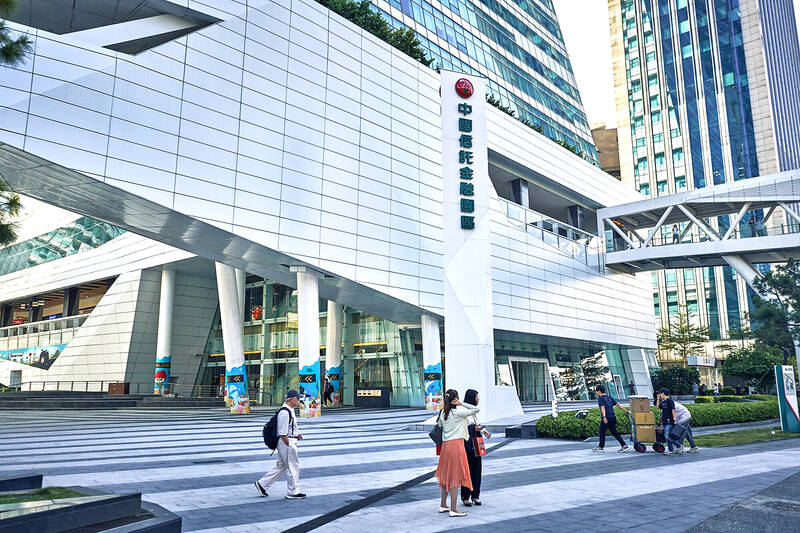Taiwanese need about NT$15 million (US$466,200) to maintain a comfortable lifestyle in retirement, but nearly 80 percent said they lack the finances to meet that target, a survey released on Tuesday by CTBC Bank (中國信託銀行) showed.
Retirement planning has rapidly grown in importance as Taiwan is set to become a “super-aged society” next year when people aged 65 and older account for 20 percent of the population, CTBC retail banking chief Yang Shui-hui (楊淑惠) said.
The issue must not be taken lightly with life expectancy in Taiwan increasing with medical and technology breakthroughs, she said.

Photo: An Rong Xu, Bloomberg
Taiwan’s current life expectancy is 81.21 years, suggesting a 0.21 percent increase from last year, according to government data, which showed a similar rate of growth in the past three years.
Most respondents said they would need an estimated NT$14.27 million to maintain a decent lifestyle after retirement, while 20 percent said they needed NT$25 million, the survey showed.
Eighty-seven percent of the respondents said they use investment tools to manage their wealth, while more than 50 percent reported investment returns of more than 5 percent in the past three years, it said.
Still, 53 percent describe market movements as “evasive” and are worried about their long-term investments, it said.
Stocks were cited as the most popular investment tool among respondents, accounting for 66.9 percent, followed by fixed-term deposits at 62.9 percent and exchange-traded funds (ETFs) at 41.9 percent, it said.
ETFs have overtaken savings-related insurance policies as the third-favorite investment vehicle, with 55 percent of respondents saying they preferred investment products that promise regular and stable cash flows.
That helped account for the surge in scale of local ETFs that feature monthly or quarterly distributions of cash dividends, CTBC Bank said, adding that a growing number of Taiwanese are counting on passive income from ETFs to sustain their lifestyle after retirement.
Nevertheless, 34.9 percent said they do not have a designated retirement account, while 34.8 percent said they worry that no one would take care of their children or sick family members after their death, and 16.1 percent said they worry about a lack of knowledge about whom and how to pass on their wealth, the survey showed.
As for what they want in retirement, good health is considered the most valuable at 81 percent, followed by traveling the world at 55 percent, and developing hobbies and habits at 23 percent, it said.
CTBC Bank conducted the poll from July 26 to Aug. 15 with 1,200 people older than 30.

Intel Corp chief executive officer Lip-Bu Tan (陳立武) is expected to meet with Taiwanese suppliers next month in conjunction with the opening of the Computex Taipei trade show, supply chain sources said on Monday. The visit, the first for Tan to Taiwan since assuming his new post last month, would be aimed at enhancing Intel’s ties with suppliers in Taiwan as he attempts to help turn around the struggling US chipmaker, the sources said. Tan is to hold a banquet to celebrate Intel’s 40-year presence in Taiwan before Computex opens on May 20 and invite dozens of Taiwanese suppliers to exchange views

Application-specific integrated circuit designer Faraday Technology Corp (智原) yesterday said that although revenue this quarter would decline 30 percent from last quarter, it retained its full-year forecast of revenue growth of 100 percent. The company attributed the quarterly drop to a slowdown in customers’ production of chips using Faraday’s advanced packaging technology. The company is still confident about its revenue growth this year, given its strong “design-win” — or the projects it won to help customers design their chips, Faraday president Steve Wang (王國雍) told an online earnings conference. “The design-win this year is better than we expected. We believe we will win

Chizuko Kimura has become the first female sushi chef in the world to win a Michelin star, fulfilling a promise she made to her dying husband to continue his legacy. The 54-year-old Japanese chef regained the Michelin star her late husband, Shunei Kimura, won three years ago for their Sushi Shunei restaurant in Paris. For Shunei Kimura, the star was a dream come true. However, the joy was short-lived. He died from cancer just three months later in June 2022. He was 65. The following year, the restaurant in the heart of Montmartre lost its star rating. Chizuko Kimura insisted that the new star is still down

While China’s leaders use their economic and political might to fight US President Donald Trump’s trade war “to the end,” its army of social media soldiers are embarking on a more humorous campaign online. Trump’s tariff blitz has seen Washington and Beijing impose eye-watering duties on imports from the other, fanning a standoff between the economic superpowers that has sparked global recession fears and sent markets into a tailspin. Trump says his policy is a response to years of being “ripped off” by other countries and aims to bring manufacturing to the US, forcing companies to employ US workers. However, China’s online warriors